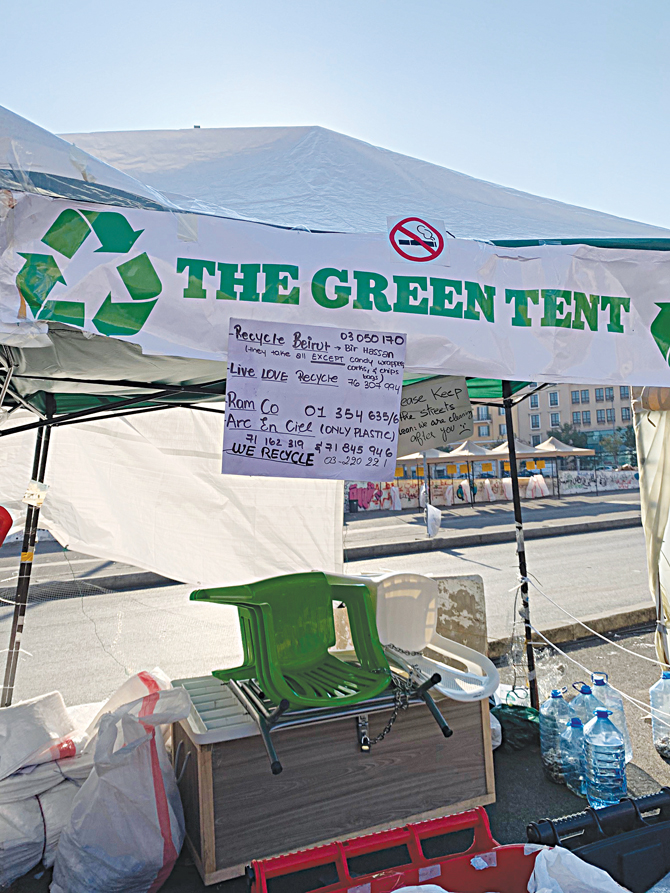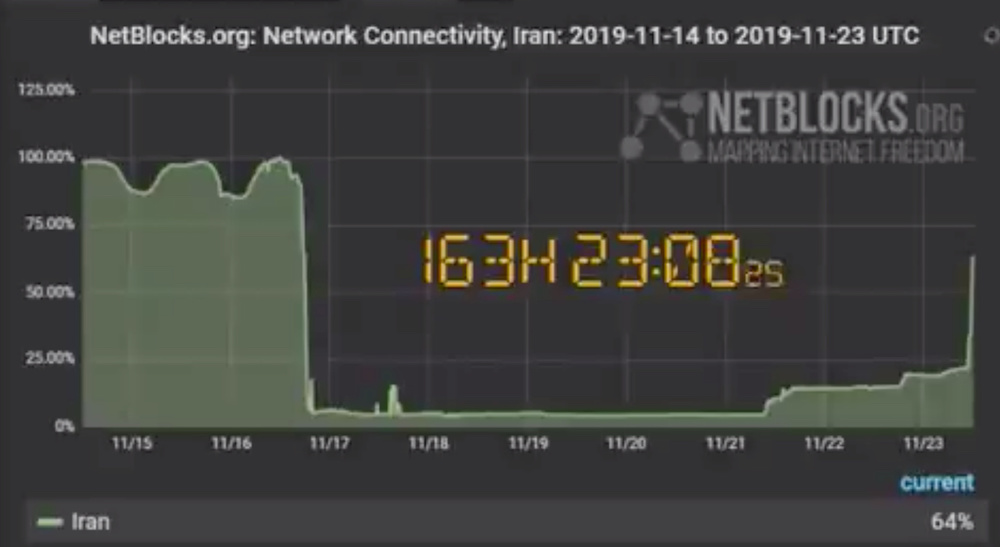Lebanon’s revolution: A many-splendored thing
BEIRUT: As Lebanon’s anti-government uprising enters its second month with no sign of losing momentum, downtown Beirut continues to wear a colorful, almost festive look.
The trappings of “Thawra” — revolution in Arabic — are hard to miss amid the chants against sectarianism and corruption: Tents, food stalls, flags of all sizes, walls covered with artwork, recycling areas and patriotic songs blaring from loudspeakers.
What began as a movement for political and economic change has morphed into something much larger. No matter how one chooses to describe the phenomenon, it has undoubtedly generated a degree of harmony, cohesion, solidarity and love among Lebanese people that was unthinkable just a few months ago.
Week after stressful week, people across the country — men and women, young and old, Lebanese citizens and expatriates — have shown endurance, discipline and restraint in the face of violence and provocation.

To many Lebanese, this has been at once the best of times and the worst of times, with tributes paid to a martyr of the “revolution” in cities across the country, the emergence of Melheme Khalaf as a glimmer of hope after he won the presidency of the Lebanese Bar Association on merit, and the president advising citizens dissatisfied with the country’s political leaders to emigrate.
Other initiatives have also sprung up — yoga and meditation, daily clean-ups by volunteers, speakers’ corners, and couches and board games.
Supporters of Lebanon’s free-form revolution are signaling their resolve to both make their country a better place and look after each other’s well-being.
Muwatin Lebnene (Lebanese Citizen), an initiative promoting regular morning clean-ups in downtown Beirut, has worked wonders for the image of the capital’s commercial hub.
Activists said that thanks to the efforts of 5,000 volunteers in the revolution’s first 10 days, 10.3 tons of waste was sorted, the number of trucks carrying waste to landfills fell by 90 percent, half a million cigarette butts were collected to be turned into paddleboards, and 2,500 pieces of winter clothing amassed and dispatched to NGOs.

“As Lebanese citizens, it is our civic duty to keep our streets clean and sort our garbage for the interest and well-being of our country,” said Timmy Jreissati, a member of Muwatin Lebnene.
“With the revolution, the idea of building awareness about the importance of this issue took hold. The initiative was meant to show the true civilized image of the Lebanese people.”
On Nov. 3, volunteers cleaned the dirt-stained and graffiti-filled exterior walls of both the Mar Geryes church and the Mohammad Al-Amin mosque. “As part of our initiative, we want to restore and preserve our country’s beautiful sites and monuments,” Jreissati said.
“Muwatin Lebnene is a spontaneous collective action of individual Lebanese citizens that was driven by civic duty and social responsibility. The initiative acts upon the needs of the country and its citizens in all civic matters and issues. To make our country better, we want to raise awareness about all civic duties, and educate and help people when needed.”
Protesters won their first battle when Saad Hariri resigned as prime minister on Oct. 29, but their stated mission — an end to corruption and an overhaul of the political system — will not be accomplished until all politicians resign and make way for a new government of technocrats.
Given the political elite’s reluctance to meet their demands and the uphill battle that lies ahead, the Lebanese who have been taking part in the protests need activities that can keep them motivated and in high spirits.
Ana Larriu, a Spanish meditation teacher who used to teach mindfulness to executives in Beirut, has been offering meditation sessions to people protesting on the streets since last month.
“I was just so frustrated that I couldn’t do anything, so I said to myself that I have to go, sit there and show that there is a different energy happening,” she told Arab News.

The effect of the meditation sessions is deeply felt, according to Larriu, who is married to a Lebanese national. Some participants found themselves weeping, regaining strength and, finally, expressing gratitude for an experience they found hard to describe in words.
“The exercise allowed a lot of things to happen, so people could express whatever they needed to without having to label them,” she said. “It’s a place of freedom. It was amazing when, in the first week after the clean-ups, mothers would come here with children and we would do active meditation for them.
“For me, the most amazing thing is to find out that a lot of people meditate in their own way.
“We need to be focused. The revolution’s energy can sometimes be very volatile and just up in the air, so we need to combine both energies — we need to be ready to fight and, at the same time, we need to be completely grounded.”
Larriu said that meditation can also make it easier for the protesters to develop compassion, both self-compassion and compassion for others. Accordingly, all the exercises she teaches involve transmitting “love to the south and north of the country.”

From her daily lessons on Samir Kassir Square, Larriu expanded to cater for protesters who sleep in tents in Martyrs’ Square.
“They came over and wanted to take part,” she said. “I realize that those in tents asleep at 8 a.m. are really tired. So we do active release exercises, which are designed to them feel great. It takes a lot of body work, more than just meditation, to release and recharge.”
Larriu said that she will continue her practice for “as long as the revolution goes on” — and as long as it is needed.
Further north in Tripoli, the long-forgotten and deserted Ghandour building was reborn as a new landmark of the “revolution” when it served as a canvas for graffiti artist Mohamed Abrashh in his rendering of the Lebanese flag as “Tripoli, City of Peace.”
As massive crowds continue to gather every night with patriotic chants and celebrations of their achievements, conversations are taking place in the afternoons in Nour Square, in Tripoli, in order to come up with novel strategies for maintaining political pressure.

Beirut’s public gardens and squares have witnessed similar discussions on topics as varied as legal mechanisms to fight corruption and recovering stolen public funds, psychological resilience in times of social change, political power and the constitutional tools needed to achieve the revolution’s goals, the country’s economy’s direction, countering violence, and a feminists’ march that took place on Nov. 3.
Early on in the uprising, as one group of citizens moved their couches, fridges, carpets, mattresses and board games to the middle of highways, turning the streets into the “House of the People,” other groups drew up a plan to form Lebanon’s longest human chain on Oct. 26 as a symbol of national unity.
“It is only when we wake up to our oneness that peace shall prevail,” said Cyril Bassil, one of the human-chain organizers.
“We hope that the human chain will always symbolize the moment the Lebanese people woke up and chose to hold hands to build a non-sectarian country and reinvent Lebanon by freeing themselves from fragmentation.”
Around 200,000 people held hands along the 171 km stretch of the coastal highway from Tyre in the south to Tripoli in the north, with towns such as Halba, in Akkar, Hasbaya and Baalbek participating.
“It was surreal,” Bassil said. “It is thanks to the Lebanese who made the human chain happen. All pacifist activities are necessary because we need to change our language and we need to learn to express ourselves from a place of love, not fear — the Lebanese proved, on that day, that the civil war was truly over.”

Students burn history books as protests continue in LebanonLebanon protesters block MPs as street battles erupt



